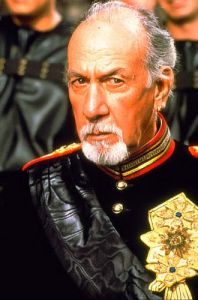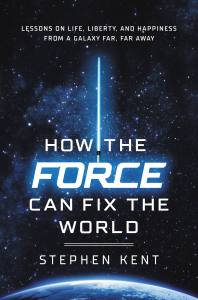I’m a longtime listener of the Beltway Banthas podcast, so I’m familiar with Stephen Kent’s thoughts on the intersection between politics and Star Wars. How the Force Can Fix the World is a distillation of some of his discussions on the podcast. However, it’s probably better to characterize this book as a self-help manual than a political analysis. Howt the Force Can Fix the World does discuss how Star Wars can inform our approach to politics, but more than that it’s about how Star Wars can help us live more mindful lives and become better citizens.
Continue reading “REVIEW: “How the Force Can Fix the World” by Stephen Kent”Tag: politics
“A People’s Future of the United States”
 I’m a political scientist and I love science fiction, so in some ways A People’s Future of the United States was right up my alley. This is a collection of short stories by progressive science fiction authors about possible visions for America’s future. Some of the stories are more literal extrapolations of present trends into the future. Others try to show how our future could be different – for better or worse. A few work more on a thematic or symbolic level than a literal level.
I’m a political scientist and I love science fiction, so in some ways A People’s Future of the United States was right up my alley. This is a collection of short stories by progressive science fiction authors about possible visions for America’s future. Some of the stories are more literal extrapolations of present trends into the future. Others try to show how our future could be different – for better or worse. A few work more on a thematic or symbolic level than a literal level.
As I mentioned, these are progressive science fiction authors. The futures imagined in this book all fall along the same political ideology. You won’t find libertarians in the vein of Robert Heinlein in this book. These stories don’t use subtle analogies to try to introduce new points of view or challenge preexisting biases. Rather, they’re bold proclamations about our political future. They’re more about inspiring those who already agree rather than persuading those who don’t. I certainly don’t say that as a criticism, but rather to note that the book will likely appeal most to certain kinds of readers.
I hope this isn’t the last book of its kind. I love the idea of science fiction authors engaging in more (overtly) political storytelling.
Game of Thrones: The Final Review
 Game of Thrones has ended. There will be no more episodes. It would have been impossible for the writers to wrap up every single plot thread in Season 8, especially because this past season had fewer episodes (6 instead of usual 10). The final episode, “The Iron Throne,” did manage to provide a sense of closure for most of the character arcs and had some incredible visual moments. However, in its rush to the end, the final episode lost sight of some of the political commentary and themes that made Game of Thrones so compelling in the first place. The raison d’être for this story is question “what makes for a good king?” The finale barely engaged with that question, which is a missed opportunity.
Game of Thrones has ended. There will be no more episodes. It would have been impossible for the writers to wrap up every single plot thread in Season 8, especially because this past season had fewer episodes (6 instead of usual 10). The final episode, “The Iron Throne,” did manage to provide a sense of closure for most of the character arcs and had some incredible visual moments. However, in its rush to the end, the final episode lost sight of some of the political commentary and themes that made Game of Thrones so compelling in the first place. The raison d’être for this story is question “what makes for a good king?” The finale barely engaged with that question, which is a missed opportunity.
*** SPOILERS for Season 8 of Game of Thrones BELOW *** Continue reading “Game of Thrones: The Final Review”
“Infomocracy” by Malka Older

For a while, I’ve felt that, when it comes to politics, science world-building has been stuck in the past, fixated on stories about galactic empires or rebellions against totalitarian regimes. Governments in science fiction almost never resembles the messy democracies of our world. By contrast, in Malka Older’s Infomocracy, the protagonists are political operatives and central threat is a conspiracy to manipulate an election. This is perhaps the first science fiction story I’ve read that takes electoral institutions seriously and makes them central to the story (not surprisingly, Older is a political scientist). Continue reading ““Infomocracy” by Malka Older”
“You Win or You Die: The Ancient World of Game of Thrones” by Ayelet Haimson Lushkov

Season 7 of HBO’s Game of Thrones just wrapped up, but the speculation and commentary still rages on. A few weeks ago, I reviewed a book about medieval warfare in Game of Thrones. This time, I take a look at You Win or You Die: The Ancient World of Game of Thrones by Ayelet Haimson Lushkov, Associate Professor of Classics at the University of Texas at Austin. This book analyzes Game of Thrones from the perspective of Greco-Roman literature, showing how ancient epics from our own world can help us better understand Westeros.
“Game of Thrones and the Medieval Art of War” by Ken Mondschein
 Like Tolkien’s Lord of the Rings mythology, George R.R. Martin’s Game of Thrones is set in a world that looks like – and is clearly inspired by – our Middle Ages, but isn’t actually set in Europe between the fall of Rome and the Renaissance. Instead, Game of Thrones takes place in a fantastical world in which winters last a generation and magic is real. However, given the similarities between our Westeros and Medieval Europe, it’s natural to wonder how much Game of Thrones accurately reflects our own history. In Game of Thrones and the Medieval Art of War, Ken Mondschein, an expert on medieval warfare, looks at how Martin’s books – and, to a lesser extent, HBO’s adaptation – depict medieval warfare. Continue reading ““Game of Thrones and the Medieval Art of War” by Ken Mondschein”
Like Tolkien’s Lord of the Rings mythology, George R.R. Martin’s Game of Thrones is set in a world that looks like – and is clearly inspired by – our Middle Ages, but isn’t actually set in Europe between the fall of Rome and the Renaissance. Instead, Game of Thrones takes place in a fantastical world in which winters last a generation and magic is real. However, given the similarities between our Westeros and Medieval Europe, it’s natural to wonder how much Game of Thrones accurately reflects our own history. In Game of Thrones and the Medieval Art of War, Ken Mondschein, an expert on medieval warfare, looks at how Martin’s books – and, to a lesser extent, HBO’s adaptation – depict medieval warfare. Continue reading ““Game of Thrones and the Medieval Art of War” by Ken Mondschein”
“Star Trek: DS9” & International Development
To celebrate the 50th anniversary of Star Trek, PopMatters is running a series of articles about the franchise. I wrote a piece about Deep Space Nine and the politics of international development. I argue that the show takes a surprisingly nuanced approach to foreign aid. Some of what I discuss is based on my experience working for democratization projects in Southeast Asia. Check it out here!
What’s wrong with the economics of sci-fi?

Economist David Berri has an article in Time criticizing the depiction of economics in science fiction. In particular, he argues that sic-fi stories frequently depict technologically advanced galactic empires despite the fact that, in the real world, autocracy sniffles economic growth. Historically, empires have seized private wealth, making citizens more reluctant to invest in technology and innovation. By contrast, inclusive governments, such as democracies, allow people to reap the rewards of their investments, thereby encouraging investment in technologies that stimulate economic growth.
I know something about both political economy and science fiction, and unfortunately Berri gets both wrong.
Continue reading “What’s wrong with the economics of sci-fi?”
“Robocop” (1987)
 I finally saw the RoboCop reboot a few months ago, so I decided to rematch the original 1987 RoboCop by director Paul Verhoeven and writer Edward Neumeier.
I finally saw the RoboCop reboot a few months ago, so I decided to rematch the original 1987 RoboCop by director Paul Verhoeven and writer Edward Neumeier.
Much has been made of Verhoeven’s social commentary in the film. As is typical of 1980s sci-fi films, the villain is a cabal of corporate executives and gangsters obsessed with profit. Through its use of fake TV infomercials, RoboCop pokes fun at excessive capitalism and its intrusion into everyday life. In the film, capitalism dehumanizes people, both figuratively, by treating them as mere consumers, and literally, when Omni Consumer Products takes police officer Murphy’s body and places it in a mechanical suit. Continue reading ““Robocop” (1987)”
“The Hobbit Party” by Jay Richards and Jonathan Witt
 Last month, I reviewed The Hobbit Party by Jay Richards and Jonathan Witt for the Signum University Newsletter. The book purports to be an analysis of politics in The Hobbit and The Lord of the Rings from a libertarian perspective. However, as much as I admired the authors’ goals, I found that the analysis sometimes overlooked important parts of the text. You can read the full review here.
Last month, I reviewed The Hobbit Party by Jay Richards and Jonathan Witt for the Signum University Newsletter. The book purports to be an analysis of politics in The Hobbit and The Lord of the Rings from a libertarian perspective. However, as much as I admired the authors’ goals, I found that the analysis sometimes overlooked important parts of the text. You can read the full review here.

